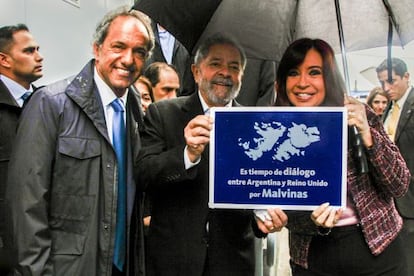Argentina declassifies Falklands War torture files
The documents confirm that the Argentinean military regularly abused its own soldiers


Argentina’s armed forces have declassified a batch of documents that substantiate claims by ex-soldiers who said they were tortured by their own superiors during the Falklands War of 1982.
In 2007, several veterans of that brief war between the United Kingdom and Argentina filed a lawsuit against their tormentors. In February, Argentina’s Supreme Court ruled that the statute of limitations on these 33-year-old crimes had expired.
Faced with this legal hurdle from the highest court in the land, President Cristina Fernández de Kirchner responded by ordering the armed forces to declassify documents related to torture practices carried out during the war.
A letter written by an ex-army chief asked subordinates to be discreet about torture
The Defense Ministry’s office of human rights examined the files and published them over the weekend on the website Archivos Abiertos (Open Files). The defendants will now be able to use these documents to bring the Supreme Court ruling before the Inter-American Court of Human Rights (IACHR) for appeal.
In the documents, most of the war veterans talk about their physical state upon returning home. They say they were subject to tortures such as “trench foot” – a painful condition caused by prolonged exposure to humidity, cold water or mud – lack of food, and being tied to poles or buried in graves as punishment for leaving their posts to search for food, which was scarce in the trenches on the freezing Falkland Islands.
Yet these are the conditions in which soldiers were meant to fight off British Prime Minister Margaret Thatcher’s powerful navy and air force. Many of the Argentinean soldiers were fighting as part of their compulsory military service. The ill-fated venture led by President Leopoldo Galtieri (1981-1982) dealt a fatal blow to the cruelest regime in Argentina’s history.
One soldier said his feet and hands were tied to his back and he was “placed face down on the ground, on wet sand, from 9am to 5pm.” Another said he was “kicked in the testicles,” and later had to “undergo surgery.”
Among the documents declassified by the Argentinean government is a secret letter written in December 1982, six months after Argentina surrendered to Great Britain and Galtieri resigned, in which then-army chief Cristino Nicolaides ordered those practices to be considered nothing more than “disciplinary offenses.” His subordinates were told to inform him only in extreme cases. “In cases where there is evidence of a violation, the respective resolutions will not exceed disciplinary measures, within standards of restraint, using appropriate discretion,” Nicolaides wrote at a time when public pressure on the military regime had become unbearable.
Argentina was calling for democracy and truth regarding the fate of thousands of people who had disappeared since the beginning of the regime’s fierce repression campaign in 1976. In 1983, then dictator Reynaldo Bignone, who has since been convicted of crimes against humanity, called elections for October and ordered all documents related to the disappearances to be burnt. But the files on the abuses committed during the Falklands War survived.
English version by Dyane Jean François.
Tu suscripción se está usando en otro dispositivo
¿Quieres añadir otro usuario a tu suscripción?
Si continúas leyendo en este dispositivo, no se podrá leer en el otro.
FlechaTu suscripción se está usando en otro dispositivo y solo puedes acceder a EL PAÍS desde un dispositivo a la vez.
Si quieres compartir tu cuenta, cambia tu suscripción a la modalidad Premium, así podrás añadir otro usuario. Cada uno accederá con su propia cuenta de email, lo que os permitirá personalizar vuestra experiencia en EL PAÍS.
¿Tienes una suscripción de empresa? Accede aquí para contratar más cuentas.
En el caso de no saber quién está usando tu cuenta, te recomendamos cambiar tu contraseña aquí.
Si decides continuar compartiendo tu cuenta, este mensaje se mostrará en tu dispositivo y en el de la otra persona que está usando tu cuenta de forma indefinida, afectando a tu experiencia de lectura. Puedes consultar aquí los términos y condiciones de la suscripción digital.








































